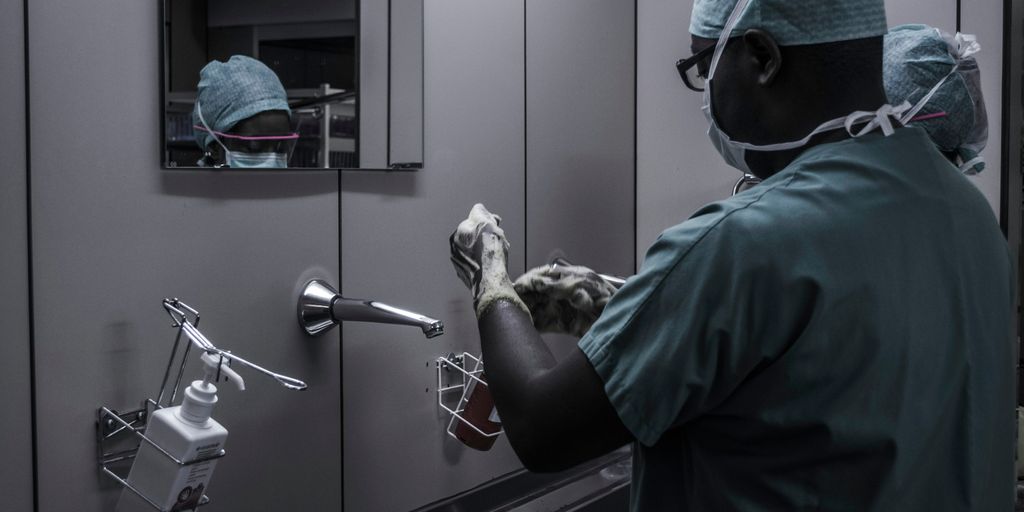Healthcare
Health News Updates: Medical Breakthroughs and Public Health Alerts

In the ever-evolving world of healthcare, new discoveries and alerts are crucial for keeping the public informed. This article highlights some of the latest breakthroughs in medicine, public health warnings, and advancements in treatment methods that could change lives. From innovative technologies to pressing health issues, here are the key takeaways you should know.
Key Takeaways
- Smartphones can help spot early signs of dementia, making early diagnosis easier.
- A new enzyme has been developed to create synthetic genetic material, opening doors for research.
- AI is being used to improve pain management, offering new hope to those suffering.
- New treatments for glioblastoma are being researched, which may lead to better outcomes for patients.
- Public health alerts are rising, especially concerning mosquito-borne illnesses linked to climate change.
Latest Medical Breakthroughs
Smartphone Data for Early Dementia Detection
Recent studies show that smartphone data can help identify early signs of dementia. By analyzing patterns in how people use their phones, researchers can spot changes that may indicate cognitive decline. This method could lead to earlier interventions and better outcomes for patients.
New Enzyme for Synthetic Genetic Material
A groundbreaking discovery has been made with a new enzyme that can create synthetic genetic material. This advancement could revolutionize genetic engineering, allowing scientists to design and manipulate DNA more efficiently. The potential applications range from medicine to agriculture, making it a significant step forward in biotechnology.
AI in Advanced Pain Management
Artificial intelligence is being utilized to improve pain management strategies. By analyzing patient data, AI can help doctors tailor treatments to individual needs, potentially leading to more effective pain relief. This approach not only enhances patient care but also reduces the reliance on opioids, addressing a critical public health issue.
Novel Therapeutic Treatments for Glioblastoma
Researchers are exploring new therapeutic options for glioblastoma, a highly aggressive brain cancer. Recent studies suggest that combining existing treatments with novel therapies could improve survival rates. This is a hopeful development for patients facing this challenging diagnosis.
The integration of smartphone data in healthcare represents a shift towards more personalized medicine, emphasizing the importance of technology in modern health solutions.
Public Health Alerts
Mosquito-Borne Illnesses and Climate Change
Mosquito-borne diseases are becoming more common due to climate change. Warmer temperatures and changing weather patterns are helping mosquitoes thrive, leading to an increase in illnesses like West Nile virus and Zika. Health experts warn that these changes could affect many communities, especially in warmer regions.
IV Fluids Shortage Due to Hurricanes
The recent hurricanes have caused a significant shortage of IV fluids in hospitals. Many healthcare facilities are struggling to keep up with the demand as they recover from the storms. This shortage can impact patient care, making it harder for hospitals to provide necessary treatments.
Tick-Borne Parasitic Disease on the Rise
Cases of tick-borne diseases are increasing, with experts linking this trend to environmental changes. The rise in temperatures allows ticks to expand their habitats, leading to more encounters with humans. This situation raises concerns about public health and safety.
Psychological Distress About Food Allergies
Many people are experiencing anxiety related to food allergies. This distress can affect their daily lives and mental health. Awareness and education about food allergies are crucial to help individuals manage their concerns effectively.
Public health alerts are essential for keeping communities informed about potential health risks. Staying updated through a reliable news website can help individuals take necessary precautions.
Innovations in Disease Treatment

Metabolic-Bariatric Surgery and Pancreatic Cancer
Recent studies show that metabolic-bariatric surgery can significantly improve outcomes for patients with pancreatic cancer. This surgery not only aids in weight loss but also enhances the body’s ability to respond to cancer treatments.
New Scanner for Blood Vessel Imaging
A groundbreaking scanner has been developed that allows doctors to see blood vessels in real-time. This technology can help in diagnosing various conditions more accurately and quickly, leading to better patient care.
Synthetic Cannabis for Alzheimer’s Agitation
Research indicates that synthetic cannabis may help reduce agitation in Alzheimer’s patients. This could provide a new avenue for treatment, offering relief to both patients and caregivers.
Stem Cell Transplants for Macular Holes
Stem cell transplants are showing promise in treating macular holes, a condition that can lead to vision loss. Early results suggest that this innovative approach may restore vision in affected individuals.
The advancements in these treatments highlight the potential for new therapeutic options that can change lives.
| Treatment Type | Condition | Effectiveness |
|---|---|---|
| Metabolic-Bariatric Surgery | Pancreatic Cancer | High |
| New Scanner | Blood Vessel Imaging | Very High |
| Synthetic Cannabis | Alzheimer’s Agitation | Moderate |
| Stem Cell Transplants | Macular Holes | Promising |
Mental Health Advances
Mental Health App for Depression Prevention
Recent studies show that a new mental health app is helping users manage their depression more effectively. This app offers personalized strategies and resources, making it easier for individuals to seek help and stay connected with their mental health journey.
Sensory CBT for Hoarding Disorder
A promising approach called Sensory Cognitive Behavioral Therapy (CBT) is being tested for those with hoarding disorder. This method focuses on engaging the senses to help individuals confront their attachments to items, leading to better outcomes in treatment.
Auditory Magic Tricks for the Blind
Innovative research is exploring how auditory magic tricks can enhance cognitive skills in blind individuals. This unique approach not only entertains but also aids in improving mental agility and focus.
Brain Network Studies on Dementia
Recent findings in brain network studies are shedding light on dementia. Researchers are discovering how different brain areas communicate, which could lead to new treatments and better understanding of the disease.
The rise in mental health awareness has been significant, especially after the pandemic. Many initiatives are now in place to improve access to mental health services, emphasizing the importance of resilience and holistic care. This shift is crucial for addressing ongoing challenges in mental health care access and equity.
Cardiology Updates
New Therapeutic Target for Cardiac Arrhythmias
Recent research has identified a new therapeutic target for treating cardiac arrhythmias. This breakthrough could lead to more effective treatments for patients suffering from irregular heartbeats. The study highlights the importance of understanding the underlying mechanisms of these conditions.
Common Chemicals Tied to Cardiac Changes
A recent study has found that certain common chemicals found in everyday products may be linked to changes in heart function. This discovery raises concerns about the long-term effects of exposure to these substances, emphasizing the need for further investigation into their impact on cardiovascular health.
SGLT2 Inhibitors in Primary Care
SGLT2 inhibitors are gaining attention in primary care settings for their role in managing diabetes and heart failure. These medications have shown promise in improving patient outcomes, making them a valuable addition to treatment plans.
Hypertension in Pregnancy
Hypertension during pregnancy is a growing concern, with recent studies indicating that it can lead to serious complications for both mother and child. Awareness and early intervention are crucial in managing this condition effectively.
Understanding the connections between environmental factors and heart health is essential for developing better prevention strategies.
| Study Focus | Key Findings |
|---|---|
| Cardiac Arrhythmias | New therapeutic target identified |
| Chemical Exposure | Linked to heart function changes |
| SGLT2 Inhibitors | Effective in diabetes and heart failure |
| Hypertension in Pregnancy | Increased risk for complications |
Technological Innovations in Healthcare
Real-Time Balance Data
Recent advancements in technology have made it possible to gather real-time data on balance. This innovation can help identify risks of falls, especially in older adults. Understanding balance can lead to better safety measures and prevent injuries.
Robotic ‘Finger’ for Patient Exams
A new robotic device designed like a finger is being used in patient examinations. This tool can enhance the accuracy of physical assessments, making it easier for doctors to diagnose conditions without discomfort to the patient.
AI for Clearer Vision
Artificial intelligence is now being used to improve vision clarity. By analyzing eye data, AI can help detect issues earlier, leading to better treatment options. This technology is a game-changer in eye care.
New Imaging Techniques for Kidney Cancer
Innovative imaging methods are being developed to detect kidney cancer more accurately. These techniques allow for earlier diagnosis, which is crucial for effective treatment.
The integration of technology in healthcare is transforming how we approach medical challenges. With tools like AI and robotics, we are moving towards a future where healthcare is more precise and accessible.
In the world of healthcare, these technological innovations are not just trends; they are essential tools that can improve patient outcomes and enhance the overall quality of care. As we continue to explore these advancements, tech reviews will play a vital role in understanding their impact.
Cancer Research Developments

Cilta-Cel for Multiple Myeloma
Recent studies show that Cilta-Cel is highly effective in treating multiple myeloma, a type of blood cancer. This therapy uses genetically modified T cells to target and destroy cancer cells. In real-world applications, patients have experienced significant improvements in their condition.
Gamma-Delta T Cells in Cancer Immunology
Research is uncovering the role of gamma-delta T cells in fighting cancer. These immune cells can recognize and attack tumor cells, offering a new avenue for immunotherapy. Their unique properties make them promising candidates for future cancer treatments.
New Mechanisms for Old Cancer Drugs
Scientists have discovered new mechanisms that explain how existing cancer drugs work. This knowledge can help improve treatment strategies and potentially enhance the effectiveness of these medications. Understanding these mechanisms is crucial for developing better therapies.
Combined Therapy for Multiple Sclerosis
A recent study has shown that a combined therapy approach can be beneficial for patients with multiple sclerosis. This method integrates different treatment modalities to improve patient outcomes, highlighting the importance of personalized medicine in cancer care.
The advancements in cancer research are paving the way for more effective treatments, offering hope to many patients. Understanding the immune system’s role in fighting cancer is crucial for future breakthroughs.
Conclusion
In summary, the world of health is constantly changing, with new discoveries and important alerts that can affect everyone. From breakthroughs in treating diseases to warnings about public health risks, staying informed is crucial. As we look ahead, it’s clear that understanding these updates can help us make better choices for our health and well-being. Keeping up with the latest news not only empowers us but also helps us support our communities in making healthier decisions.
Frequently Asked Questions
What are the latest breakthroughs in medicine?
Recent advancements include using smartphone data to detect early signs of dementia and new treatments for various cancers.
How can climate change affect public health?
Climate change can increase the spread of diseases like those carried by mosquitoes and ticks.
What should I know about the shortage of IV fluids?
Hurricanes have disrupted production, leading to a shortage of IV fluids that hospitals rely on.
How is technology helping in healthcare?
Innovations like AI and new imaging techniques are improving diagnosis and treatment options.
What are some mental health advancements?
New apps are being developed to help prevent depression and treat disorders like hoarding.
Why is cancer research important?
Ongoing research aims to find better treatments and understand the mechanisms behind different cancers.
-

 Press Release4 days ago
Press Release4 days agoClinical Trials Market Set for Robust Growth, Driven by Drug Development Surge and Digital Innovation
-

 Press Release7 days ago
Press Release7 days agoBellarium ($BEL) Price Prediction: Could It Hit $5 by 2026?
-

 Business6 days ago
Business6 days agoHow Managed IT Solutions Help Small Teams Compete at Enterprise Scale
-

 Press Release5 days ago
Press Release5 days agoIndustrial Boiler Market Expected to Surpass USD 24.4 Billion by 2035 Amid Growing Demand for Energy Efficiency and Industrialization
-

 Press Release5 days ago
Press Release5 days agoGreen Bio Chemicals Market Poised for Sustainable Growth amidst Global Shift to Eco-Friendly Alternatives by 2035
-

 Press Release5 days ago
Press Release5 days agoFill-Finish Pharmaceutical Contract Manufacturing Market Expected to Flourish Amid Biopharmaceutical Boom and Global Outsourcing Trend by 2035
-

 Press Release5 days ago
Press Release5 days agoPreventive Vaccines Market to Witness Strong Growth by 2035
-

 Press Release5 days ago
Press Release5 days agoPet Food Nutraceutical Market Set for Robust Expansion Amid Rising Demand for Pet Wellness by 2035






























